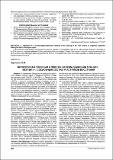| dc.contributor.author | Карпович, Олег Валерьевич | |
| dc.coverage.spatial | Брест | |
| dc.date.accessioned | 2021-04-13T06:39:19Z | |
| dc.date.available | 2021-04-13T06:39:19Z | |
| dc.date.issued | 2007 | |
| dc.identifier.citation | Карпович, О. В. Могилевская губерния в повстанческом движении 1830-1831, 1863-1864 гг.: сословный состав участников восстаний / О. В. Карпович // Вестник Брестского государственного технического университета. Серия: Гуманитарные науки. – 2007. – № 6. – С. 20–23. | |
| dc.identifier.uri | https://rep.bstu.by/handle/data/12842 | |
| dc.description | KARPOVICH O.V. Mogilyov province in the insurgent movement 1830-1831, 1863-1864: the class structure of the participants of revolts | |
| dc.description.abstract | Современная белорусская историография вопросу сословного состава участников восстаний 1830-1831 и 1863-1864 гг. практически не уделяет внимания, а это главный ключ к изучению характера восстаний и его движущих сил. Данная статья посвящена анализу сословного состава повстанческих отрядов на территории Могилевской губернии в период восстаний 1830-1831 и 1863-1864 гг., раскрываются причины, по которым не удалось развернуть широкое повстанческое движение в указанном регионе, указывается отношение простого населения к представителям восставших и их целям. | |
| dc.language.iso | ru | |
| dc.publisher | БрГТУ | |
| dc.title | Могилевская губерния в повстанческом движении 1830-1831, 1863-1864 гг.: сословный состав участников восстаний | |
| dc.type | Статья (Article) | |
| dc.identifier.udc | 947.6 | |
| dc.abstract.alternative | The modern belarussian historiography practically does not attend to the question of the class structure of participants of revolts in1830-1831 and 1863-1864. It is the main key to studying of the revolt’s character and its driving forces. The presented article is devoted to the analysis of class structure of insurgent groups on the territory of the Mogilyov province in 1830-1831 and 1863-1864. The author develop the reasons, on which the wide insurgent movement was not possible in the specified region. It is presented the attitude of the simple population to representatives of the revolted people and their purposes. | |
